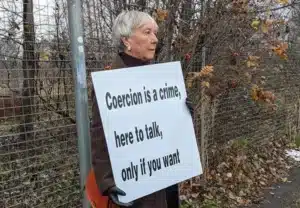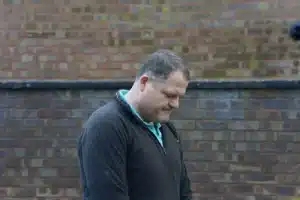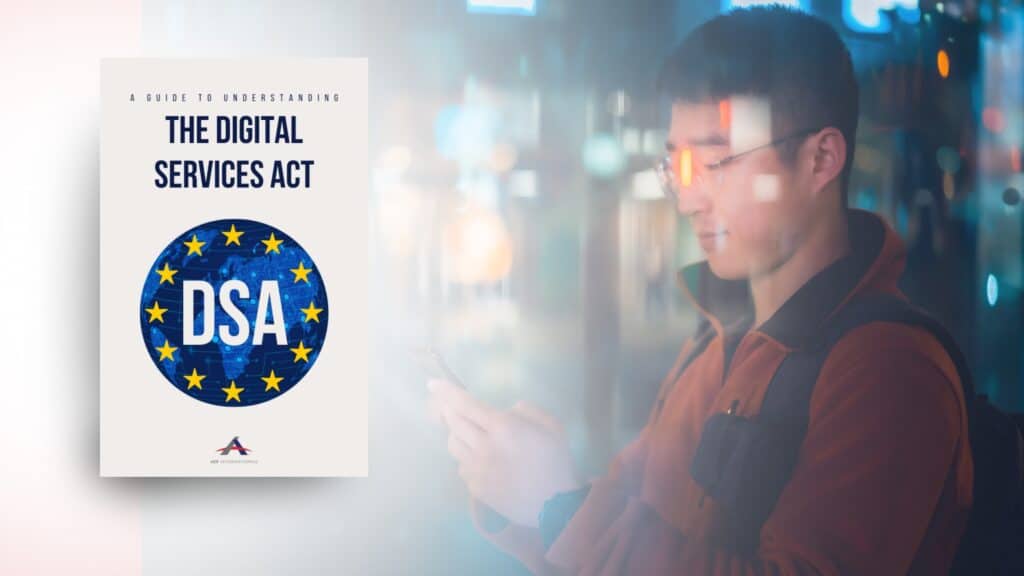- WATCH: Police accuse Isabel Vaughan-Spruce, “you’ve said you’ve been engaging in prayer, which is the offence”
- Arrest comes only weeks after the court confirmed that Vaughan-Spruce was “not guilty” of breaking PSPO “buffer zone” by silently praying
- MPs to vote TODAY on whether to roll out “buffer zones” across England & Wale
BIRMINGHAM (7th March 2023) – Isabel Vaughan-Spruce has been arrested for the second time for the “offence” of silently praying in her head within an abortion facility censorship zone or “buffer zone”.
You are currently viewing a placeholder content from X. To access the actual content, click the button below. Please note that doing so will share data with third-party providers.
Bail conditions have been imposed on Vaughan-Spruce prohibiting her from attending an area within the vicinity of the abortion facility which extends beyond the censorial “buffer zone”.
The arrest, which was attended by six police officers, comes only weeks after the charitable volunteer was found “not guilty” by Birmingham Magistrates’ Court. She had been criminally charged on the basis that her silent, imperceptible prayers amounted to “intimidation”.
The prosecution were not able to present any evidence to the court to substantiate the “thoughtcrime”, and Isabel’s name was cleared.
“Only three weeks ago, it was made clear by the court that my silent prayers were not a crime. And yet, again, I have been arrested and treated as a criminal for having the exact same thoughts in my head, in the same location. The ambiguity of laws that limit free expression and thought – even in peaceful, consensual conversation or in silent, internal prayer – leads to abject confusion, to the detriment of important fundamental rights. Nobody should be criminalised for their thoughts.”
Vaughan-Spruce has volunteered to support women in crisis pregnancies for twenty years. In February, she was cleared of criminal charges for violating a Public Spaces Protection Order (PSPO), which enforces a censorship zone around the abortion facility on Station Road, Birmingham. The full text of the PSPO, banning prayer, among other activities considered to constitute protest, is available here.
ADF UK, the legal organisation which protects fundamental freedoms and has campaigned against censorship zones, supported Vaughan-Spruce’s court victory in February. They have committed to standing up for her freedom of thought.
A local resident, Edel, who lives close to the abortion facility in question commented about Vaughan-Spruce’s arrest:
“There seems to be crime happening that is left unaddressed. And yet it is the people who are praying who are being targeted. I really question what the police are doing and why they’re spending their time and resources into targeting innocent people.”
MPs to vote on nationalising censorship zones TODAY, 7 March 2023
This afternoon, the House of Commons will debate the rollout of censorship zones across the country. Clause 10 of the Public Order Bill would criminalise any form of “influencing” outside of abortion facilities, which would include prayer, consensual peaceful conversations, or offers of help about services available to those who would like an alternative choice to abortion.
Andrew Lewer MP has proposed an amendment to the bill that would exempt silent prayer and consensual conversations from the ban.
Reflecting ahead of today’s parliamentary debate, Jeremiah Igunnubole, legal counsel for Alliance Defending Freedom UK said:
“MPs will for the first time in Modern British history be able to vote to make it abundantly clear that there is no room for “thoughtcrime” in modern UK law. It is deeply concerning that the basic rights of freedom of thought, peaceful expression, and individual liberty are even up for debate. This isn’t 1984, but 2023 – nobody should be criminalised for their thoughts, for their prayers, and for a consensual conversation on a public street.
The cack-handed attempts to repeatedly criminalise Isabel’s prayers, and the clear confusion on the behalf of police officers about the status of freedom of thought under the law, makes clear that censorial “buffer zones” are not fit for purpose in a democratic society.
We all stand firmly against harassment on public streets. Harassment is already illegal. A government review in 2018 found that harassment near abortion facilities is rare, and peaceful prayer and offers of charitable help were the most common activities there. The government concluded at that point that censorship zones would be disproportionate. No further reviews have since been conducted. What has now changed?
MPs should use their vote today to uphold freedom to pray, and have consensual conversations, on our streets.”




